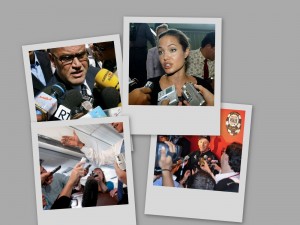The Mirror, Vol. 15, No. 700
There were some happenings in Cambodia recently which raised concerns – some related to the Internet, some related to other forms of reporting in and from Cambodia.
We therefore re-present an old – well, is form November 2010 old? – document about the freedom of communication. The author: “Sir Timothy John ‘Tim’ Berners-Lee, OM, KBE, FRS, FREng, FRSA, is a British engineer and computer scientist and a professor at MIT [the prestigious US Massachusetts Institute of Technology], credited with inventing the World Wide Web, making the first proposal for it in March 1989.”
Long Live the Web: A Call for Continued Open Standards and Neutrality
The Web is critical not merely to the digital revolution but to our continued prosperity – and even our liberty. Like democracy itself, it needs defending.The World Wide Web went live, on my physical desktop in Geneva, Switzerland, in December 1990. It consisted of one Web site and one browser, which happened to be on the same computer. The simple setup demonstrated a profound concept: that any person could share information with anyone else, anywhere. In this spirit, the Web spread quickly from the grassroots up. Today, at its 20th anniversary, the Web is thoroughly integrated into our daily lives. We take it for granted, expecting it to “be there” at any instant, like electricity.
The Web evolved into a powerful, ubiquitous tool because it was built on egalitarian principles and because thousands of individuals, universities and companies have worked, both independently and together as part of the World Wide Web Consortium, to expand its capabilities based on those principles.
The Web as we know it, however, is being threatened in different ways. Some of its most successful inhabitants have begun to chip away at its principles. Large social-networking sites are walling off information posted by their users from the rest of the Web. Wireless Internet providers are being tempted to slow traffic to sites with which they have not made deals. Governments—totalitarian and democratic alike—are monitoring people’s online habits, endangering important human rights.
If we, the Web’s users, allow these and other trends to proceed unchecked, the Web could be broken into fragmented islands. We could lose the freedom to connect with whichever Web sites we want. The ill effects could extend to smartphones and pads, which are also portals to the extensive information that the Web provides.
Why should you care? Because the Web is yours. It is a public resource on which you, your business, your community, and your government depend. The Web is also vital to democracy, a communications channel that makes possible a continuous worldwide conversation. The Web is now more critical to free speech than any other medium. It brings principles established in the U.S. Constitution, the British Magna Carta and other important documents into the network age: freedom from being snooped on, filtered, censored, and disconnected.
The following happenings in Cambodia cause concern:
On 15.1.2011, The Mirror had reported that two cameras – one of a licensed journalist, and one of a student of photography – were confiscated so as to erase pictures which members of the security forces did not want to be seen publicly.
Then, since 21.1.2011, there were mysterious reports about web site blockings. They were mysterious, because at the beginning there were a variety of reports which sites were blocked, and the staff of some ISPs said this was in response to orders from government agencies – but later, such reports about allegedly government intentions to curtail the free access to the Internet were officially denied.
This results in an extremely unpleasant situation: Who is in control of the free access to information on the Internet? In face of the clear denials by government agencies that the disruption of access to some web sites was not based on any government orders, one has to ask: Who is taking over the role of censorship? Who is responsible, if expectations, based on a contract with an Internet Service Provider that I will have access to the content on the World Wide Web, are not fulfilled?
Will the government tolerate such private censorship imposed by anonymous forces? Will the Internet users accept this infringement of their contracted rights silently?
Finally, on 22.1.2011, it was reported that voice recorders of journalists had been taken away by order of the chairperson of the Anti-Corruption Unit during a press conference. The spokesperson of the Council of Ministers claimed that government officials have the right to confiscate tapes to protect the privacy and dignity of the speakers. It was not reported that he had pointing to any specific legal basis for such a claim, relating to recordings of public statements, nor that he had defined which level of officials – in addition to judges – are allowed to confiscate the professional equipment of journalists.
It has to be considered that the statements of public persons are regularly recorded by journalists either by taking notes on paper, or by making electronic recordings. Sometimes journalists are accused of false reports, claiming that what they reported is not what has been said. The availability of small, portable voice recorders serve to eliminate such controversies.
The Ministry of Information and other organizations have made efforts to institute official spokespersons at Ministries and other government agencies. The Ministry of Information has also stated that the confiscation of cameras of journalists is not acceptable, and should be challenged in court. If it would become illegal to record the words of government officials spoken publicly – especially at press conferences – the whole exercise of a multi-party liberal democracy, as defined in the Constitution of the Kingdom of Cambodia, would become impossible.
Norbert KLEIN
Please recommend The Mirror also to your colleagues and friends.


Recent Comments